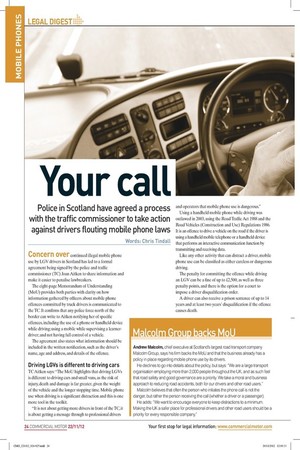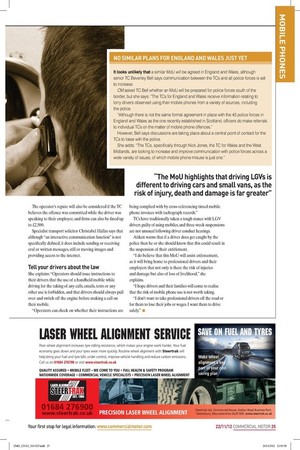Your call
Page 16

Page 17

If you've noticed an error in this article please click here to report it so we can fix it.
Police in Scotland have agreed a process with the traffic commissioner to take action against drivers flouting mobile phone laws
Words: Chris Tindall
Concern over continued illegal mobile phone use by LGV drivers in Scotland has led to a formal agreement being signed by the police and traffic commissioner (TC) Joan Aitken to share information and make it easier to penalise lawbreakers.
The eight-page Memorandum of Understanding (MoU) provides both parties with clarity on how information gathered by officers about mobile phone offences committed by truck drivers is communicated to the TC. It confirms that any police force north of the border can write to Aitken notifying her of specific offences, including the use of a phone or handheld device while driving; using a mobile while supervising a learnerdriver; and not having full control of a vehicle.
The agreement also states what information should be included in the written notification, such as the driver’s name, age and address, and details of the offence.
Driving LGVs is different to driving cars
TC Aitken says: “The MoU highlights that driving LGVs is different to driving cars and small vans, as the risk of injury, death and damage is far greater, given the weight of the vehicle and the longer stopping time. Mobile phone use when driving is a significant distraction and this is one more tool in the toolkit.
“It is not about getting more drivers in front of the TC, it is about getting a message through to professional drivers and operators that mobile phone use is dangerous.” Using a handheld mobile phone while driving was outlawed in 2003, using the Road Traffic Act 1988 and the Road Vehicles (Construction and Use) Regulations 1986. It is an offence to drive a vehicle on the road if the driver is using a handheld mobile telephone or a handheld device that performs an interactive communication function by transmitting and receiving data.
Like any other activity that can distract a driver, mobile phone use can be classified as either careless or dangerous driving.
The penalty for committing the offence while driving an LGV can be a fine of up to £2,500, as well as three penalty points, and there is the option for a court to impose a driver disqualification order.
A driver can also receive a prison sentence of up to 14 years and at least two years’ disqualification if the offence causes death. The operator’s repute will also be considered if the TC believes the offence was committed while the driver was speaking to their employer, and firms can also be fined up to £2,500.
Specialist transport solicitor Christabel Hallas says that although “an interactive communication function” is not specifically defined, it does include sending or receiving oral or written messages, still or moving images and providing access to the internet.
Tell your drivers about the law
She explains: “Operators should issue instructions to their drivers that the use of a handheld mobile while driving for the taking of any calls, emails, texts or any other use is forbidden, and that drivers should always pull over and switch off the engine before making a call on their mobile.
“Operators can check on whether their instructions are being complied with by cross-referencing timed mobile phone invoices with tachograph records.” TCs have traditionally taken a tough stance with LGV drivers guilty of using mobiles, and three-week suspensions are not unusual following driver conduct hearings.
Aitken warns that if a driver does get caught by the police then he or she should know that this could result in the suspension of their entitlement.
“I do believe that this MoU will assist enforcement, as it will bring home to professional drivers and their employers that not only is there the risk of injuries and damage but also of loss of livelihood,” she explains.
“I hope drivers and their families will come to realise that the risk of mobile phone use is not worth taking.
“I don’t want to take professional drivers off the road or for them to lose their jobs or wages. I want them to drive safely.” ■
Malcolm Group backs MoU
Andrew Malcolm, chief executive at Scotland’s largest road transport company Malcolm Group, says his firm backs the MoU and that the business already has a policy in place regarding mobile phone use by its drivers.
He declines to go into details about the policy, but says: “We are a large transport organisation employing more than 2,000 people throughout the UK, and as such feel that road safety and good governance are a priority. We take a moral and business approach to reducing road accidents, both for our drivers and other road users.” Malcolm believes that often the person who initiates the phone call is not the danger, but rather the person receiving the call (whether a driver or a passenger).
He adds: “We want to encourage everyone to keep distractions to a minimum. Making the UK a safer place for professional drivers and other road users should be a priority for every responsible company.”
NO SIMILAR PLANS FOR ENGLAND AND WALES JUST YET
It looks unlikely that a similar MoU will be agreed in England and Wales, although senior TC Beverley Bell says communication between the TCs and all police forces is set to increase.
CM asked TC Bell whether an MoU will be prepared for police forces south of the border, but she says: “The TCs for England and Wales receive information relating to lorry drivers observed using their mobile phones from a variety of sources, including the police.
“Although there is not the same formal agreement in place with the 43 police forces in England and Wales as the one recently established in Scotland, officers do make referrals to individual TCs on the matter of mobile phone offences.” However, Bell says discussions are taking place about a central point of contact for the TCs to liaise with the police.
She adds: “The TCs, specifically through Nick Jones, the TC for Wales and the West Midlands, are looking to increase and improve communication with police forces across a wide variety of issues, of which mobile phone misuse is just one.”










































